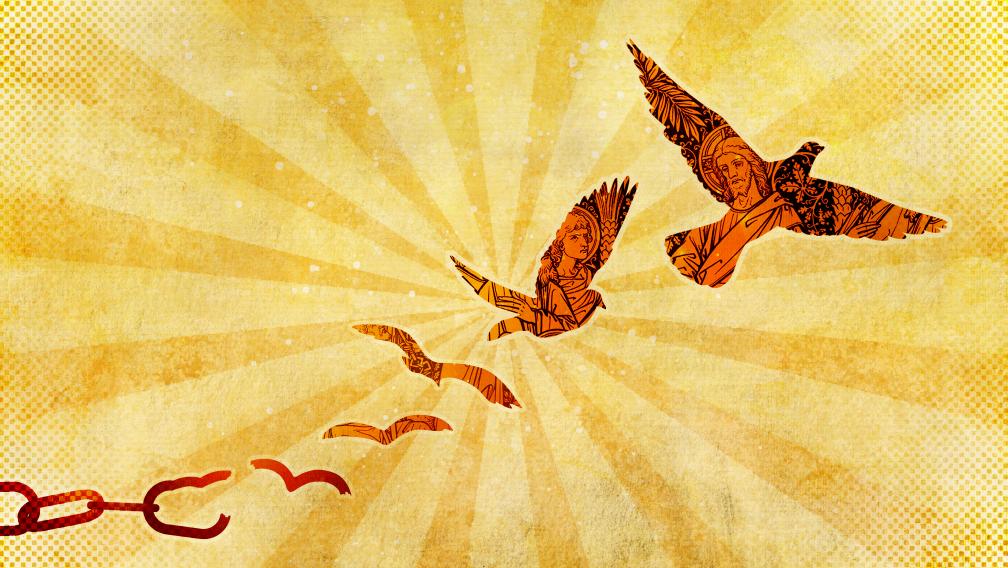God’s Judgment Is Not What You Think

“As the people were filled with expectation, and all were questioning in their hearts concerning John, whether he might be the Messiah, John answered all of them by saying, ‘I baptize you with water; but one who is more powerful than I is coming . . . He will baptize you with the Holy Spirit and fire.’” — Luke 3:15–16
The kingdom of God has begun, and it cannot be stopped.
This is the heart of this week’s message from Luke’s Gospel, the message the prophet John the Baptist came to declare: that God has come into the world in the person of Jesus and nothing will ever be the same again.
Jesus is “more powerful” than John because, while John has been baptizing with mere water, Jesus will baptize with “the Holy Spirit and fire.” Jesus comes, in other words, with all the might of God, inaugurating a new epoch where time itself will be reframed, unending justice will be established, and all who choose to follow God will be gathered into the storehouse of God’s grace.
Such a message can, paradoxically, feel scary or liberating. John claims that Jesus comes with a “winnowing fork, to clear his threshing floor” — far from an innocuous arrival. He is gathering “wheat into his granary” and burning the “chaff.” The winnowing fork is here a symbol of God’s discerning judgment, as Jesus separates out the part of the wheat that is not good for nourishment. Such imagery plays on a metaphor reminiscent of Psalm 1, a passage that John surely knew:
Blessed is the one who does not walk in step with the wicked . . . but whose delight is in the law of the Lord, and who meditates on his law day and night. That person is like a tree planted by streams of water, which yields its fruit in season . . . whatever they do prospers. Not so the wicked! They are like chaff that the wind blows away.
In what ways are we living out Jesus’s call to be good news — to be nourishment — in the world?”
Jesus’s granary, in other words, is the place where those who have followed God’s precepts — those who delight in God’s will and ways of being — will find a home. In this refuge, they are not easily swayed by the ways of the world, blowing to and fro in the winds of change. They are not afraid of God’s justice, nor scandalized by God’s wide-reaching mercy. Instead, they are rooted in their trust in God revealed in Jesus, like trees flourishing beside an ever-flowing river.
This is, as the Gospels tell us, good news for the poor. But for those who hoard wealth, lord their power over the weak, and refuse to follow Jesus’s example, John’s words are intimidating. Like chaff, their actions hold no nutritive or sustaining substance, no blessing for the world. Without a connected and grounded integrity, they blow away like flimsy feathers in the light of Jesus’s upending arrival. The “unquenchable fire” is not an indication of some hellish afterlife but a metaphor for the ways the actions of the tyrannical create a hell on earth for the weak (and, truly, for themselves).
Luke’s Gospel therefore poses to each of us a question for deep discernment: In what ways are we living out Jesus’s call to be good news — to be nourishment — in the world? At Jesus’s own baptism, God the Father proclaims a blessing upon him: “This is my beloved, with whom I am well-pleased.” For those who follow God, this same blessing is bestowed. But Luke also hints that, as the Psalmist says, we should not “walk in step with the wicked.” Instead, we should seek to walk with Jesus, trusting his cadence and pace, and allow our own hearts — and the wheat and the chaff within them — to be transformed by the baptism that keeps us abiding in God’s deep goodness.
Read all of Sunday’s scriptures
Step Into the Story
Here are some ways to think about what it means to walk with Jesus and delight in God’s ways of being.
Art
Some of the details have faded in Rembrandt’s John the Baptist Preaching, but the artist’s use of light remains evident. It calls to mind John’s father’s prediction that, in John’s ministry, “the dawn from on high will break upon us, to shine upon those who sit in darkness and in the shadow of death, to guide our feet into the way of peace” (Luke 1:78–79).
Theology
In this short talk, Duke professor and Episcopal priest Lauren Winner invites us to reflect on the image of the Holy Spirit descending as a pigeon at Jesus’s baptism. Along with other overlooked metaphors for God, the pigeon speaks to a God who appears to us in the everyday.
Music
In this throwback, singer-songwriter Kim Hill sings Psalm 1: “The Lord holds the plans and the paths of all who follow him.”
Summerlee Staten is the executive director for Faith Formation and Education at Trinity Church





